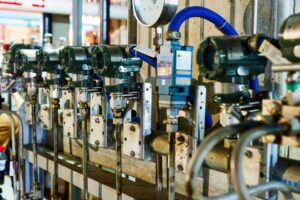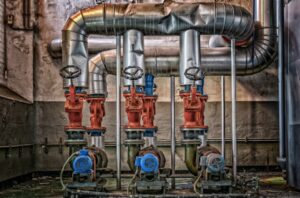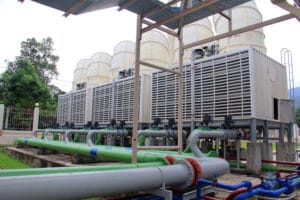Engineering Excellence: Innovations in Industrial Boiler Repair
Industrial Boiler Repair: Industrial boilers play a vital role in various sectors, providing heat, steam, and power for a multitude of processes. However, like any complex machinery, boilers require regular maintenance and repairs to ensure optimal performance, safety, and efficiency. In recent years, the field of industrial boiler repair has undergone significant transformations due to advancements in engineering and technology. This article delves into the innovations that have propelled industrial boiler repair to new heights of excellence.
1. Remote Monitoring and Diagnostics: Modern industrial boiler repair incorporates the use of advanced sensors and IoT (Internet of Things) technology. Remote monitoring systems allow technicians to track key operational parameters and diagnose issues in real time. This not only enhances preventive maintenance but also enables rapid response to emerging problems, minimizing downtime and reducing repair costs.
2. Predictive Maintenance: Innovations in data analytics and machine learning have given rise to predictive maintenance strategies. By analyzing historical data and real-time performance metrics, these systems can forecast potential failures, allowing maintenance teams to intervene proactively before significant issues arise. This approach optimizes repair schedules, minimizes production disruptions, and extends the operational lifespan of boilers.
3. 3D Printing and Custom Components: 3D printing, also known as additive manufacturing, has revolutionized the production of replacement parts for industrial boilers. Custom components can be quickly and cost-effectively manufactured on-demand, reducing lead times for repairs. This flexibility is particularly valuable for older boilers where finding replacement parts might be a challenge.
4. Non-Destructive Testing (NDT) Techniques: Traditional methods of inspecting boiler internals often involve dismantling parts, leading to extended downtime. Non-destructive testing techniques such as ultrasound, radiography, and thermal imaging have emerged as game-changers. These methods allow technicians to inspect the boiler’s integrity without the need for dismantling, resulting in quicker assessments and reduced downtime.
5. Advanced Coatings and Materials: Innovative coatings and materials are being developed to enhance the durability and corrosion resistance of boiler components. These coatings can extend the lifespan of critical parts, reducing the frequency of repairs. Additionally, advancements in materials science have led to the creation of more robust components that can withstand higher temperatures and pressures, improving overall boiler performance.
6. Augmented Reality (AR) and Virtual Reality (VR) Training: Training technicians for complex boiler repair tasks can be time-consuming and costly. AR and VR technologies are being employed to create immersive training environments. This allows technicians to simulate repairs and practice procedures in a risk-free virtual setting, increasing their proficiency and confidence before working on actual boilers.
7. Green Technologies: Sustainability and environmental concerns are driving innovations in industrial boiler repair. Efforts are being made to develop repair techniques that reduce emissions and improve energy efficiency. These include optimizing combustion processes, implementing waste heat recovery systems, and exploring renewable energy integration to power boiler operations.
Conclusion: Engineering excellence has propelled industrial boiler repair into a new era of innovation and efficiency. The integration of remote monitoring, predictive maintenance, advanced materials, and emerging technologies ensures that industrial boilers can continue to operate reliably and sustainably. As industries strive for optimal performance, reduced downtime, and increased safety, these innovations are reshaping the landscape of industrial boiler repair for the better.
Redefining Reliability: Modern Approaches to Industrial Boiler Repair
In the realm of industrial operations, where consistent performance is paramount, industrial boilers stand as indispensable workhorses. These complex machines provide the vital energy and heat required for a wide range of processes across industries. To uphold this reliability, the field of industrial boiler repair has been undergoing a significant transformation through the infusion of modern approaches. This article delves into how these innovative methods are redefining the concept of reliability in industrial boiler repair.
1. Condition-Based Monitoring and Analytics: The advent of the Internet of Things (IoT) and advanced sensors has ushered in a new era of condition-based monitoring. Industrial boilers are now equipped with an array of sensors that collect real-time data on various parameters, such as temperature, pressure, and fuel consumption. This data is then analyzed using sophisticated analytics tools to identify patterns and anomalies, enabling proactive maintenance before potential issues escalate into costly breakdowns.
2. Precision through Predictive Analytics: Predictive analytics leverages historical data and machine learning algorithms to predict when maintenance will be required. By assessing the degradation rates of components and considering operational conditions, maintenance teams can develop finely tuned maintenance schedules. This precision minimizes unnecessary downtime and maximizes the operational lifespan of the boiler.

3. Remote Assistance and Augmented Reality: Distance is no longer a barrier to effective boiler repair with the incorporation of remote assistance and augmented reality (AR). Technicians can now wear AR glasses that overlay information onto their field of view. This technology enables experts to guide on-site technicians through complex repair procedures in real time, reducing the risk of errors and improving repair efficiency.
4. Non-Intrusive Inspection Techniques: Traditional inspection methods often require disassembling parts for a thorough assessment, leading to extended downtimes. Non-intrusive techniques such as ultrasonic testing, radiography, and thermography provide detailed insights into the boiler’s condition without the need for dismantling. This not only accelerates the inspection process but also reduces operational interruptions.
5. Data-Driven Spare Parts Management: Modern approaches to industrial boiler repair are reshaping spare parts management. Through historical data analysis, maintenance teams can identify the components that are most prone to failure. This enables them to stock critical spare parts strategically, ensuring swift replacements and minimizing downtime in case of a breakdown.
6. Lean and Green Repair Practices: In a world increasingly conscious of sustainability, repair practices are aligning with green initiatives. Lean methodologies optimize repair processes, eliminating waste and enhancing efficiency. Furthermore, repair procedures are being designed to improve energy efficiency and minimize environmental impact, contributing to a more sustainable industrial landscape.
7. Continuous Training and Skill Enhancement: Modern approaches recognize that a skilled workforce is the cornerstone of reliable industrial boiler repair. Continuous training programs keep technicians updated with the latest repair techniques and technologies. Simulators, virtual reality, and augmented reality are used to provide hands-on training experiences that enhance technician proficiency and confidence.
Conclusion: Modern approaches to industrial boiler repair are not just about fixing problems; they are about redefining reliability through proactive measures, data-driven decision-making, and the integration of cutting-edge technologies. By embracing these innovations, industries can ensure that their boilers remain reliable, efficient, and cost-effective, laying the foundation for seamless operations and sustainable growth in an ever-evolving industrial landscape.
Safeguarding Operations: The Role of Proactive Industrial Boiler Repair
In the heart of industrial processes, industrial boilers stand as essential components, powering an array of operations that span diverse industries. These complex machines serve as the backbone of heat and energy production, making their reliable operation critical for seamless productivity. As industries evolve, so does the approach to maintaining these vital assets. This article delves into the pivotal role of proactive industrial boiler repair in safeguarding operations and ensuring uninterrupted productivity.
1. Preventing Costly Downtime: Downtime due to unexpected boiler failures can have severe financial implications for industries. Proactive industrial boiler repair focuses on identifying and rectifying potential issues before they escalate into major breakdowns. By conducting regular inspections, monitoring performance metrics, and employing predictive maintenance techniques, maintenance teams can address problems in their infancy, minimizing unplanned downtime and its associated costs.
2. Enhancing Safety and Compliance: Industrial boilers operate under high pressures and temperatures, making their safe operation paramount. Proactive repair not only safeguards the boiler’s functionality but also ensures compliance with rigorous safety standards and regulations. By preemptively addressing safety concerns, industries can create a secure working environment for their employees while also avoiding legal and regulatory complications.

3. Extending Equipment Lifespan: Industrial boilers represent significant investments for industries, and their longevity directly impacts the return on investment. Proactive repair strategies, such as thorough inspections and timely replacements of worn components, extend the operational lifespan of the boiler. This not only maximizes the value of the initial investment but also delays the need for more expensive replacements.
4. Optimal Energy Efficiency: Well-maintained boilers operate more efficiently, utilizing fuel and resources more effectively to produce heat and energy. Proactive industrial boiler repair focuses on optimizing combustion processes, fine-tuning controls, and eliminating energy-wasting inefficiencies. This not only reduces operational costs but also aligns with sustainability goals by minimizing resource consumption and emissions.
5. Predictive Insights through Data: In the age of digitalization, data plays a crucial role in proactive repair strategies. Real-time data from sensors and monitoring systems provide insights into the boiler’s health, enabling maintenance teams to make informed decisions. By analyzing historical trends and patterns, predictive models can be developed to forecast potential issues, allowing for targeted interventions.
6. Minimizing Operational Disruptions: Industries rely on continuous operations to meet production targets and maintain customer satisfaction. A sudden boiler failure can disrupt the entire production chain. Proactive industrial boiler repair aims to reduce such disruptions by identifying vulnerabilities and addressing them before they lead to unplanned downtime. This ensures a smoother production flow and consistent output.
7. Managing Repair Costs: Proactive repair is an investment that pays dividends in the long run. While it involves upfront costs, it prevents larger expenses associated with emergency repairs, component replacements, and production losses. By managing repair costs proactively, industries can allocate resources more effectively and maintain a predictable budget.
Conclusion: Proactive industrial boiler repair is not merely about fixing problems as they arise; it’s a strategic approach to safeguarding operations, enhancing efficiency, and promoting safety. By identifying potential issues before they escalate, industries can ensure the smooth and uninterrupted functioning of their boilers, fostering a reliable and productive operational environment that contributes to their long-term success.
Industrial Boiler Repair Demystified: A Step-by-Step Guide to Success
Industrial boilers form the backbone of numerous industrial processes, providing essential heat and power. Yet, the prospect of repairing these complex machines can often seem daunting, shrouded in technical complexity. This article aims to demystify the process of industrial boiler repair, breaking it down into a comprehensive step-by-step guide that leads to successful repairs and optimized performance.
Step 1: Assessment and Inspection The journey to successful industrial boiler repair begins with a thorough assessment and inspection. Technicians start by evaluating the boiler’s overall condition, examining key components, and identifying areas that may require attention. Advanced non-destructive testing techniques, such as ultrasonic testing and thermal imaging, play a pivotal role in uncovering hidden defects without dismantling the boiler.
Step 2: Diagnostics and Problem Identification Once the initial assessment is complete, technicians move on to diagnostics. Data from sensors and monitoring systems provide insights into the boiler’s operational parameters. By analyzing this data, technicians can pinpoint potential issues, determine their root causes, and develop a clear understanding of what needs repair.
Step 3: Planning and Strategy Development With a comprehensive understanding of the boiler’s condition and the underlying problems, technicians devise a repair strategy. This includes planning the sequence of repairs, identifying necessary replacement parts, and estimating the timeline and resources required for the job. A well-thought-out strategy minimizes downtime and ensures a smooth repair process.

Step 4: Replacement and Repairs The actual repair work commences in this step. Technicians replace faulty components, repair damaged sections, and address any issues identified during the assessment and diagnostics stages. This may involve tasks such as welding, machining, and alignment adjustments. Attention to detail and adherence to industry standards are crucial at this stage to ensure the integrity of the repairs.
Step 5: Testing and Quality Assurance After repairs are completed, the boiler undergoes thorough testing to ensure its functionality, safety, and compliance with standards. Various tests, such as pressure tests and performance evaluations, are conducted to verify that the repairs have been successful. Quality assurance processes guarantee that the repaired boiler is ready to resume normal operation.
Step 6: Monitoring and Post-Repair Analysis Once the repaired boiler is back in operation, continuous monitoring plays a vital role. Post-repair analysis involves tracking performance metrics, observing the impact of repairs, and assessing whether the boiler is operating optimally. This step helps identify any residual issues and fine-tune the repairs if necessary.
Step 7: Documentation and Reporting Accurate documentation is crucial for maintaining a history of repairs, tracking maintenance schedules, and meeting regulatory requirements. Technicians create detailed reports outlining the repairs performed, the components replaced, and any recommendations for future maintenance.
Conclusion: Industrial boiler repair may appear enigmatic, but with a systematic step-by-step approach, it becomes a manageable and successful endeavor. From assessment and diagnostics to repairs, testing, and documentation, each stage contributes to restoring the boiler’s functionality and optimizing its performance. By following this guide, industries can ensure safe, efficient, and reliable boiler operation, while demystifying the repair process for the better.
Maintaining Momentum: Industrial Boiler Repair for Uninterrupted Production
In the fast-paced world of industrial operations, maintaining consistent production is paramount. Industrial boilers play a vital role in providing the heat, energy, and steam required for various processes. However, the potential for unforeseen breakdowns can disrupt production chains and lead to significant financial losses. This article delves into the importance of industrial boiler repair in ensuring uninterrupted production and explores strategies to maintain momentum.
1. Proactive Maintenance Strategies: The key to uninterrupted production lies in proactive maintenance strategies. Rather than waiting for a breakdown to occur, industries are adopting preventive and predictive maintenance approaches. Regular inspections, routine servicing, and data-driven analysis help identify potential issues before they escalate, minimizing unplanned downtime.
2. Scheduled Maintenance Windows: To maintain momentum, industries schedule maintenance during planned downtimes or off-peak periods. This approach ensures that repairs and maintenance activities are carried out without interrupting critical production processes. By strategically timing maintenance, industries can optimize both operational efficiency and repair effectiveness.
3. Emergency Preparedness: Despite the best preventive measures, emergencies can still arise. Industries are equipping themselves with contingency plans to address sudden boiler breakdowns. This includes having skilled technicians on call, maintaining a stock of critical spare parts, and establishing clear protocols for rapid response to minimize downtime.
4. Rapid Repair Execution: When a boiler does require repair, speed is of the essence. Rapid execution of repairs, facilitated by well-trained technicians, streamlined procedures, and access to necessary replacement parts, ensures that production resumes as quickly as possible. This requires having a well-prepared repair team and the necessary resources on standby.
5. Parallel Systems and Redundancy: For industries with critical production processes, redundancy is a powerful strategy. Having parallel boiler systems that can be switched over in case of a breakdown provides a seamless transition, ensuring that production continues without substantial disruptions.
6. Real-time Monitoring and Predictive Analytics: Modern technology offers real-time monitoring and predictive analytics capabilities. Continuous monitoring of the boiler’s health, performance, and operational parameters allows industries to identify deviations from the norm. Predictive analytics can then forecast potential failures, enabling proactive interventions before issues impact production.
7. Continuous Workforce Training: A skilled workforce is essential for maintaining momentum during repairs. Continuous training programs ensure that technicians are up-to-date with the latest repair techniques, safety protocols, and technology advancements. Well-trained technicians are more efficient at diagnosing issues and implementing effective repairs.
8. Documentation and Analysis: Thorough documentation of repairs, maintenance activities, and their impact on production provides valuable insights. Analyzing this data over time can reveal patterns, helping industries fine-tune their maintenance strategies for better efficiency and reduced downtime.
Conclusion: In the pursuit of uninterrupted production, industrial boiler repair takes center stage. By adopting proactive maintenance strategies, preparing for emergencies, leveraging technology, and maintaining a skilled workforce, industries can uphold their production momentum. Industrial boiler repair not only safeguards operations but also ensures that industries remain agile and responsive to challenges, positioning them for sustained growth and success.
Address
7200 Distribution Dr, Louisville, KY 40258Phone: (502) 384-8500 Email: ACS.receptionist@AllianceComfortSys.com
Opening Hours
| Monday | 9:00 a.m. – 5:00 p.m. |
| Tuesday | 9:00 a.m. – 5:00 p.m. |
| Wednesday | 9:00 a.m. – 5:00 p.m. |
| Thursday | 9:00 a.m. – 5:00 p.m. |
| Friday | 9:00 a.m. – 5:00 p.m. |
| Saturday | Closed |
| Sunday | Closed |








